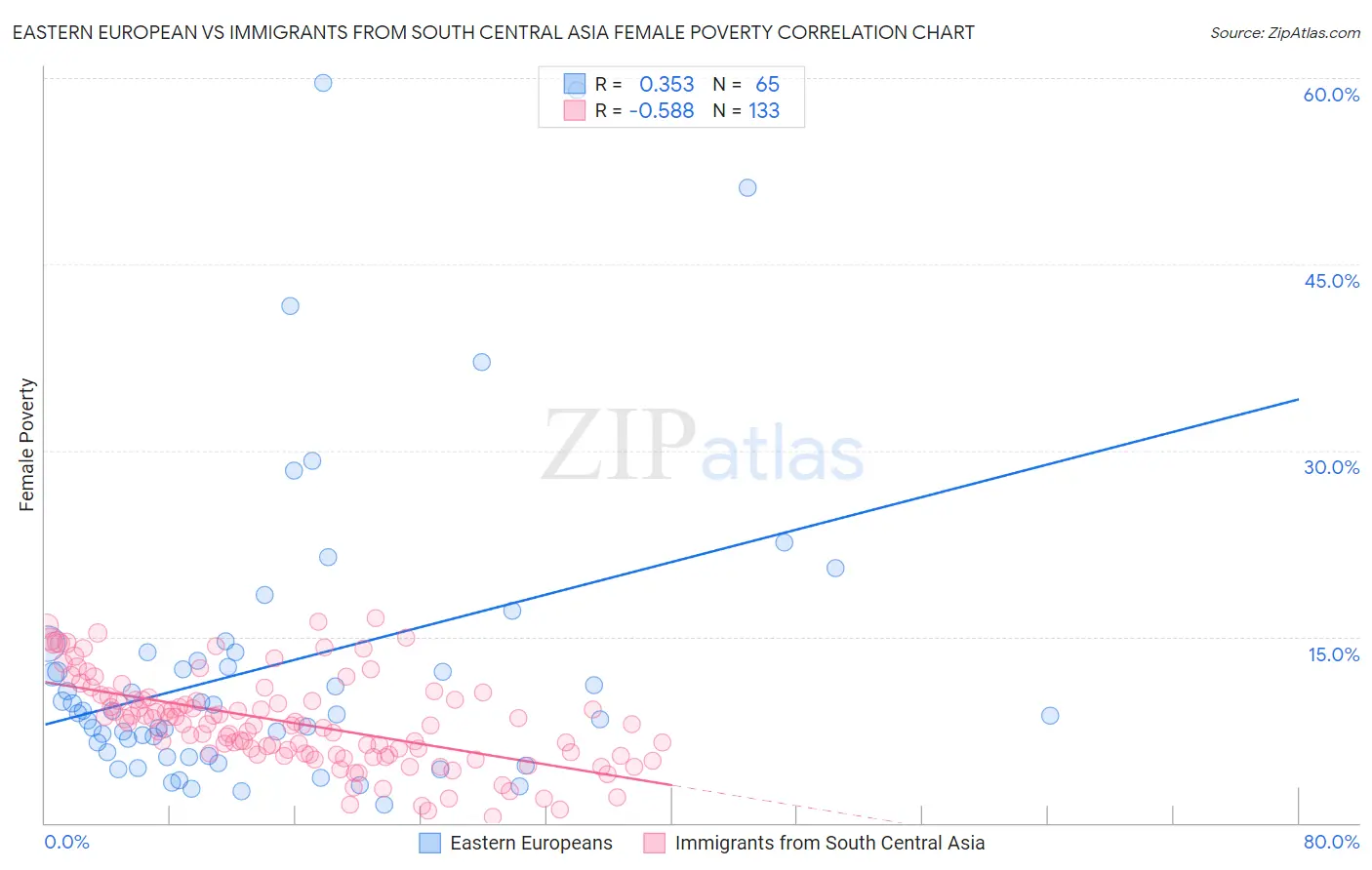Eastern European vs Immigrants from South Central Asia Female Poverty
COMPARE
Eastern European
Immigrants from South Central Asia
Female Poverty
Female Poverty Comparison
Eastern Europeans
Immigrants from South Central Asia
11.5%
FEMALE POVERTY
99.7/ 100
METRIC RATING
20th/ 347
METRIC RANK
11.1%
FEMALE POVERTY
99.9/ 100
METRIC RATING
8th/ 347
METRIC RANK
Eastern European vs Immigrants from South Central Asia Female Poverty Correlation Chart
The statistical analysis conducted on geographies consisting of 460,773,883 people shows a mild positive correlation between the proportion of Eastern Europeans and poverty level among females in the United States with a correlation coefficient (R) of 0.353 and weighted average of 11.5%. Similarly, the statistical analysis conducted on geographies consisting of 472,522,923 people shows a substantial negative correlation between the proportion of Immigrants from South Central Asia and poverty level among females in the United States with a correlation coefficient (R) of -0.588 and weighted average of 11.1%, a difference of 3.8%.

Female Poverty Correlation Summary
| Measurement | Eastern European | Immigrants from South Central Asia |
| Minimum | 1.4% | 0.46% |
| Maximum | 59.6% | 16.5% |
| Range | 58.2% | 16.1% |
| Mean | 12.7% | 8.1% |
| Median | 8.8% | 7.9% |
| Interquartile 25% (IQ1) | 5.5% | 5.5% |
| Interquartile 75% (IQ3) | 13.4% | 10.0% |
| Interquartile Range (IQR) | 7.9% | 4.5% |
| Standard Deviation (Sample) | 12.4% | 3.6% |
| Standard Deviation (Population) | 12.3% | 3.6% |
Demographics Similar to Eastern Europeans and Immigrants from South Central Asia by Female Poverty
In terms of female poverty, the demographic groups most similar to Eastern Europeans are Norwegian (11.5%, a difference of 0.23%), Immigrants from Scotland (11.5%, a difference of 0.27%), Bolivian (11.5%, a difference of 0.32%), Immigrants from Bolivia (11.5%, a difference of 0.39%), and Italian (11.6%, a difference of 0.50%). Similarly, the demographic groups most similar to Immigrants from South Central Asia are Bulgarian (11.1%, a difference of 0.19%), Assyrian/Chaldean/Syriac (11.0%, a difference of 0.70%), Immigrants from Hong Kong (11.2%, a difference of 0.99%), Immigrants from Ireland (11.0%, a difference of 1.1%), and Maltese (11.2%, a difference of 1.1%).
| Demographics | Rating | Rank | Female Poverty |
| Immigrants | Taiwan | 100.0 /100 | #4 | Exceptional 10.5% |
| Filipinos | 100.0 /100 | #5 | Exceptional 10.9% |
| Immigrants | Ireland | 99.9 /100 | #6 | Exceptional 11.0% |
| Assyrians/Chaldeans/Syriacs | 99.9 /100 | #7 | Exceptional 11.0% |
| Immigrants | South Central Asia | 99.9 /100 | #8 | Exceptional 11.1% |
| Bulgarians | 99.9 /100 | #9 | Exceptional 11.1% |
| Immigrants | Hong Kong | 99.9 /100 | #10 | Exceptional 11.2% |
| Maltese | 99.9 /100 | #11 | Exceptional 11.2% |
| Bhutanese | 99.9 /100 | #12 | Exceptional 11.3% |
| Immigrants | Lithuania | 99.9 /100 | #13 | Exceptional 11.3% |
| Lithuanians | 99.8 /100 | #14 | Exceptional 11.4% |
| Latvians | 99.8 /100 | #15 | Exceptional 11.4% |
| Immigrants | Bolivia | 99.8 /100 | #16 | Exceptional 11.5% |
| Bolivians | 99.8 /100 | #17 | Exceptional 11.5% |
| Immigrants | Scotland | 99.8 /100 | #18 | Exceptional 11.5% |
| Norwegians | 99.8 /100 | #19 | Exceptional 11.5% |
| Eastern Europeans | 99.7 /100 | #20 | Exceptional 11.5% |
| Italians | 99.7 /100 | #21 | Exceptional 11.6% |
| Swedes | 99.7 /100 | #22 | Exceptional 11.6% |
| Burmese | 99.7 /100 | #23 | Exceptional 11.6% |
| Luxembourgers | 99.7 /100 | #24 | Exceptional 11.6% |